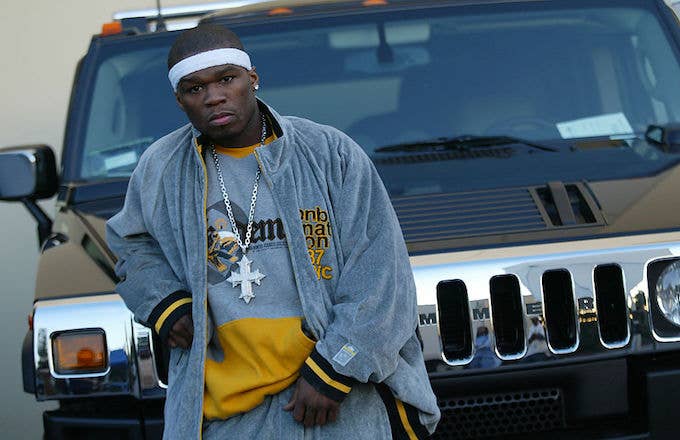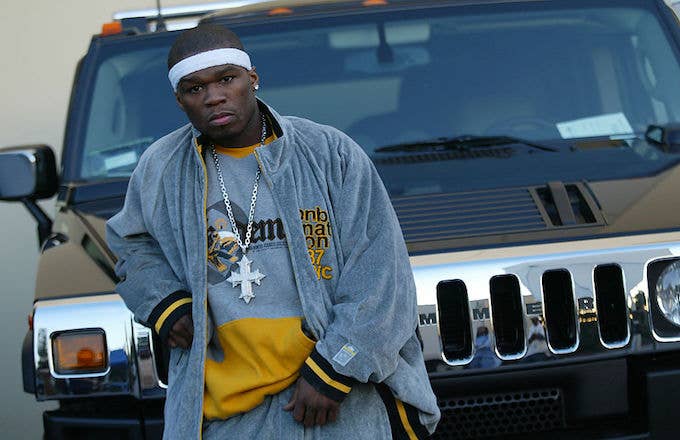
50 Cent’s 2003 opus Get Rich or Die Tryin’ is the album that made him a star. It sold millions upon millions of copies, and set Fif’ up for a career that has since branched out into movies, TV, vodka, lawsuits, and more.
But while GRODT might have gotten the Queens rapper to the top, it was also the album that ensured he wouldn’t stay there. 50’s career has played out like a Greek tragedy or a Shakespeare play: his greatest success contained the seeds of his downfall.
To understand this, we have to look back a little bit, to the run that built up his buzz in the first place. Projects like 50 Cent Is the Future and No Mercy, No Fear—and even the material that predated that, when he was signed to Columbia—showed a funny, hungry up-and-coming rapper with nothing to lose. In fact, the first time a lot of his peers paid any attention to 50 at all was when he threatened to rob almost all of them on a single track, insulting them along the way.
Having something to lose did something that getting shot nine times couldn’t—it made 50 Cent vulnerable.
50 Cent was not afraid of anything or anyone: feuding with Jay Z on “Be a Gentleman,” talking about Queens’ most notorious criminals and drug dealers—by name—on “Ghetto Qu’ran,” and even insulting a feared gang on “Round Here” [“The Latin Kings don’t like me, I don’t care,” he rapped. “We don’t talk that ‘Mira mira’ bullshit around here.”] And he did it all with a sly sense of humor, and full knowledge that he was playing the villain. He even poked fun at his own shooting. [“I done did so much dirt in the hood/Niggas heard I was shot, they were all saying, ‘Good!’”]
50 was accompanied by a crew in his adventures. G-Unit initially consisted of Tony Yayo, the ride-or-die soldier; and Lloyd Banks, the young spitter with a seemingly endless supply of punchlines. They assisted 50 in jacking songs, catching (metaphorical) bodies, and having loads of fun in the process—which was reflected in the music he produced.
But along came Eminem and Dre. Getting discovered by the Interscope machine led to a more powerful, streamlined, concise, and frequently shirtless 50 Cent, solely designed to get and keep people’s attention. In fact, this very conceit of designing Fif’ to be the ultimate rap star was acknowledged in the “In Da Club” video, where the rapper perfects his look and lyrics in the “Shady/Aftermath Artist Development Center.”
At least initially, the operation was a success. Get Rich or Die Tryin’ contained enough powerful beats, great song concepts, and digs at rap rival Ja Rule to disguise something very fundamental: this was a different 50. There were a vanishingly small number of street-level Queens tales—almost all of them confined to “Many Men (Wish Death)”—on the album. Yayo and Banks, separated, appeared on one song each. 50’s sly humor was replaced almost entirely by outright threats. But because the record sounded so masterful, and the rapper’s personality was still evident, it sold incredibly well.
But losing what made 50 Cent distinctive had its costs. Following that album, G-Unit appearances were relegated to mixtapes and group albums, before the original crew fell apart entirely. 50's future solo efforts, attempting to recapture the massive success of GRODT, became increasingly formulaic. Songs fell into a number of easily-defined categories: the I’m-a-tough-guy-don’t-mess-with-me boast, the I-have-so-much-money celebration, the sex-as-destination track (“Candy Shop,” “Amusement Park”), or the Eminem duet.
And audiences could tell. Rather than the cultural explosion that was “In Da Club,” 50’s album rollouts became a melange of lukewarmly-received singles, release date delays, and failed publicity stunts.
50’s career has played out like a Greek tragedy or a Shakespeare play: his greatest success contained the seeds of his downfall.
Even more importantly, being thrust to the top of the rap game changed the location of 50’s humor. Now, instead of being an underdog aiming at established stars like Jay Z and Ghostface, he was the commercial king of the rap game, punching down at people like Jadakiss and Fat Joe, often for the slightest of transgressions. Having something to lose did something that getting shot nine times couldn’t—it made 50 Cent vulnerable. As a result he suffered serious blows in a series of beefs with Rick Ross, Jada, and Cam’ron, and the whole process turned Fif’ from an antihero to something closer to a bully. As time went on, 50’s bullying only got worse, to the point where he was releasing sex tapes of people without their consent, openly wishing Rick Ross dead while Rozay was in the middle of a serious health scare and, most recently, poking fun at Kanye West’s distressed TMZ Live rant. And 50 making fun of himself? Well, that all but dropped off the radar.
The end result of all of this? 50 is still successful, but more as a vodka pitchman and a star of Power than as a rapper. He’s released just two albums in the past decade, only one of which even went gold. As much as fans might hope for a return of the 50 they once loved, it seems impossible—you can’t be the hungry underdog once you have your own biopic.
50 Cent has shown over and over again that he won’t listen to conventional wisdom. Whether it was making fun of the head of his label, insulting dangerous criminals, or feuding with his own protégé, Curtis Jackson has always done exactly what he wanted. Sadly, the one place he has played it safe has been the one place it really matters—the music. An attempt to replicate past successes has left us with the worst of both worlds: an antagonistic, bullying 50 in his public statements and a conservative, predictable one in the studio. 50 Cent may have gotten rich, but we wish he was still trying.


